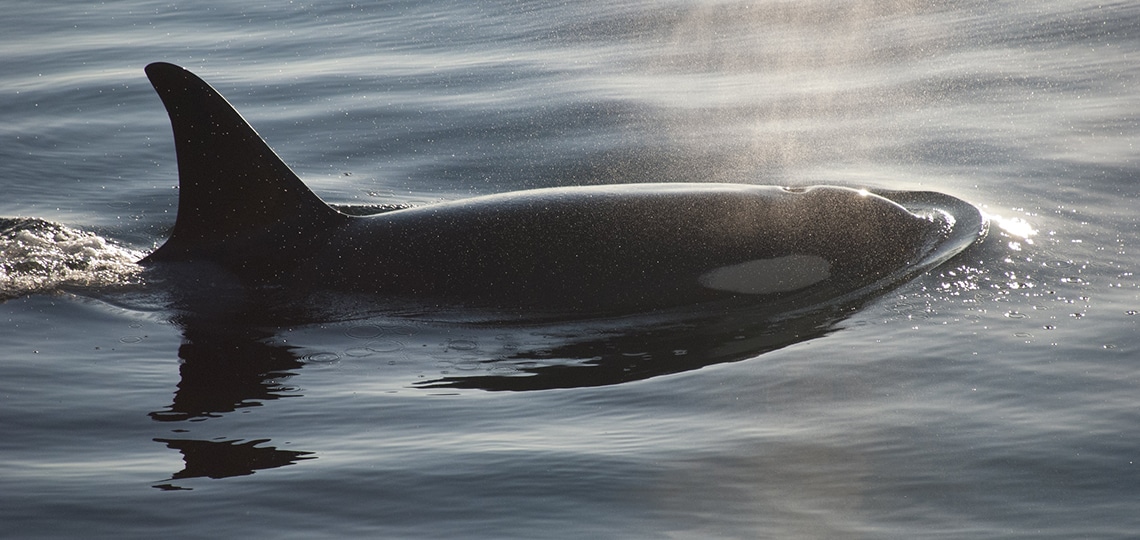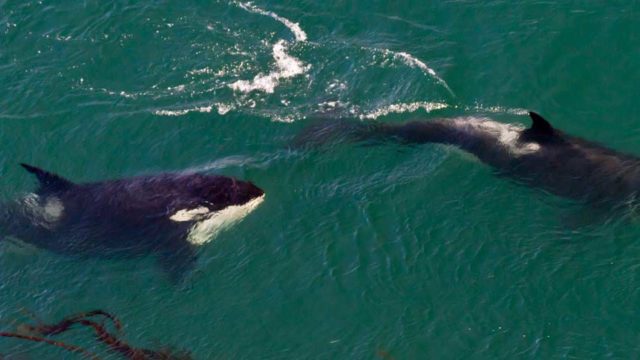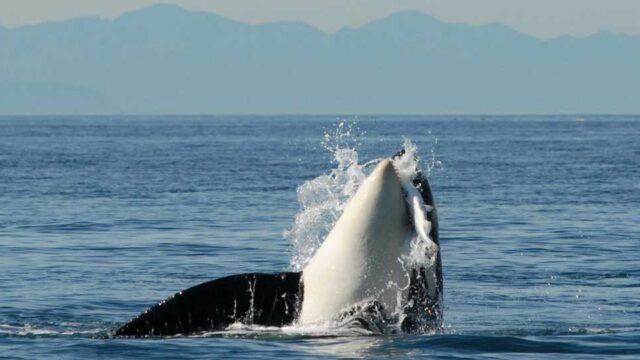Lawyer Dyna Tuytel reflects on what the end to Ecojustice’s legal fight to protect Southern Resident killer whales from Trans Mountain will mean for the whales and for Ecojustice, following a disappointing decision from the Supreme Court of Canada.
Six years of fighting to protect Southern Resident killer whales from the Trans Mountain pipeline have come to a quiet close.
Earlier this month, the Supreme Court of Canada (SCC) dismissed a case Ecojustice brought on behalf of Raincoast Conservation Foundation and Living Oceans Society. The groups had asked the court to hear their challenge of the federal government’s decision to re-approve the Trans Mountain pipeline in June 2019.
Read Ecojustice’s media statement reacting to the Supreme Court decision.
We knew that there was a chance the court would rule this way. On average, the SCC only agrees to hear about 10 per cent of cases brought before it.
However, we also strongly believed it was important to bring this case as far as we could — both for the future of the Southern Resident killer whales and for endangered species law in Canada.
And I know many Canadians agreed. Over the course of the last half a decade, thousands of Ecojustice supporters mobilized to support our Trans Mountain work by tweeting and writing letters to MPs, sending messages of support to myself and my colleagues, and donating to fund this work.
I know many of you will share our disappointment in the court’s decision, and I’m sure you have questions about what it will mean going forward, both for the whales and for Ecojustice. This blog aims to address some of these queries — and express our gratitude for supporting this case for the last six years.
Is this the end for legal challenges against the Trans Mountain pipeline project?
The SCC decision means there are currently no open legal challenges against the government’s decision to re-approve the Trans Mountain project — but that could change.
When the SCC declined to hear Ecojustice’s Trans Mountain challenge, it also announced it would not hear a number of separate cases, brought by First Nations, another environmental organization, and a group of young people. All of these cases would have challenged the pipeline expansion on environmental law grounds.
For these environmental cases, the SCC decision marked the end of the line. However, the Squamish Nation, Tsleil-Waututh Nation, the Ts’elxwéyeqw Tribes and Coldwater Indian Band have asked the Supreme Court to consider a separate set of cases asking whether the government did not properly consult with them before re-approving the project.
Ecojustice is not involved in that litigation.
What does this decision mean for the future of the Southern Resident killer whales?
The SCC decision not to hear Ecojustice’s case is another blow to the future of the Southern Resident killer whales — but it’s also important to remember that the Trans Mountain expansion isn’t the only threat to this endangered population.
Southern Resident killer whales are already struggling in the face of existing pressures that pose imminent threats to their survival. A shortage of Chinook salmon, the whales’ main source of prey, high vessel traffic and underwater noise, and toxic pollution in the whales’ critical habitat, are all contributing to the population’s decline.
According to the official count by the Centre for Whales Research, there were only 73 Southern Residents left in July 2019. Since then, another whale, L41, has gone missing and is presumed dead. That leaves only 72 members, the lowest count in decades.
In fact, the last time scientists recorded so few Southern Residents was in the 1970s, immediately following a devastating period in which humans decimated the population by capturing nearly 70 Resident and Transient killer whales for display in marine parks.
Without immediate, decisive and effective action, we risk losing Southern Resident killer whales altogether — and additional threats from the Trans Mountain pipeline will only make the situation more dire. That’s why Ecojustice and its partners continue to urge the government to introduce strong, enforceable measures to protect this species.
What’s next? Will Ecojustice continue to work to protect Southern Resident killer whales?
The federal government is responsible for protecting at-risk marine species, including the Southern Residents, and Ecojustice is committed to holding it accountable.
To date, the government has pledged to implement a suite of non-binding policies to protect the Southern Residents. Some of these measures are temporary, while others are nothing more than vaguely-defined goals for the future. While Ecojustice maintains these measures do not go far enough, we continue to urge the government to stick to these commitments — and to do so before creating new threats from new projects, including the Trans Mountain pipeline expansion.
We also urge the Minister of Environment and Climate Change and Minister of Fisheries and Oceans to go further and introduce enforceable, legally-binding protections for the whales, such as mandatory — instead of voluntary — vessel slow-downs and a measurable underwater noise reduction target.
Another threat to salmon and orcas: The Terminal 2 expansion
Ecojustice is also fighting to protect the Southern Resident killer whales from another proposed project off the B.C. coast: the Terminal 2 (T2) expansion at Roberts Bank.
If built, this proposed shipping terminal expansion would destroy important habitat in the Fraser River Estuary, interrupt Chinook migration patterns, and make it even harder for Southern Resident killer whales to find food.
In March 2020, an environmental assessment report report found the project would have significant adverse effects on Chinook salmon and significant adverse and cumulative effects on Southern Resident killer whales. Now, the fate of T2 is in the hands of Minister of Environment and Climate Change Jonathan Wilkinson.
Together with Ecojustice supporters across the country, we’re urging the Minister not to approve T2. Please, join us and speak up for wild salmon and endangered orcas. Send a letter to Minister Wilkinson and your local MP today:
Finally, a thank you.
My friends and family sometimes joke that I am a “whale lawyer” — and the amount of orca artwork around my desk certainly lends itself to that theory.
All jokes aside, having the opportunity to use my abilities as a lawyer to fight for the Southern Resident killer whales has been one of great honours of my career so far.
Though the SCC’s decision not to hear Ecojustice’s Trans Mountain case is disappointing, I am comforted by the fact that, thanks to you, we took this litigation as far as it could go. And, with your help, we will continue to fight for the Southern Resident killer whales and other species and ecosystems across Canada.
As is the case with everything Ecojustice does, our work to protect the Southern Residents is only possible because there is a community of Ecojustice supporters — including you — who share our vision of world where strong, well-enforced laws ensure nature and the environment are thriving, the climate is safe, and communities are healthy.
Thank you for standing with us.
Note: This blog was updated on April 20, 2020, to reflect updates on the Terminal 2 project.





